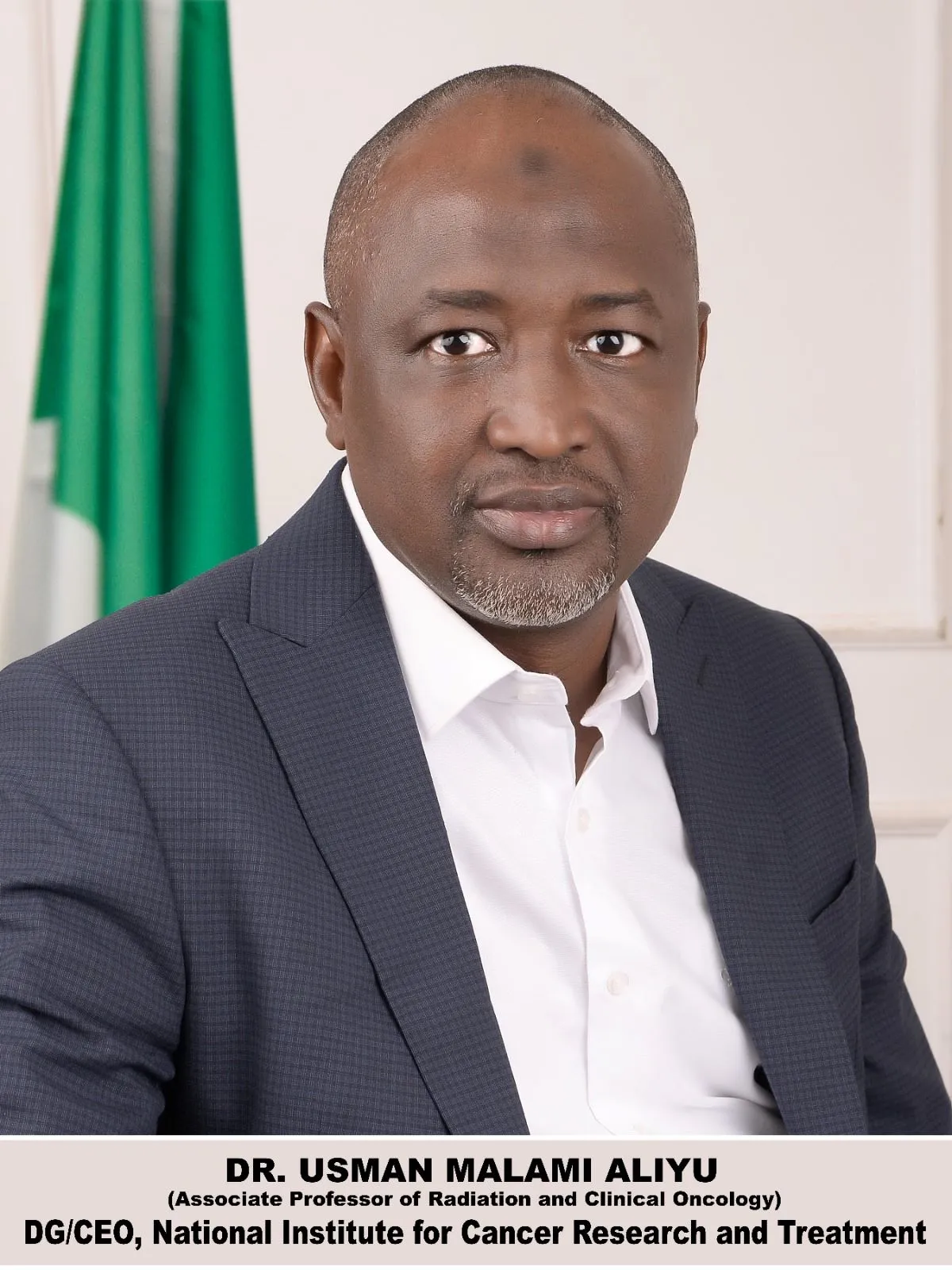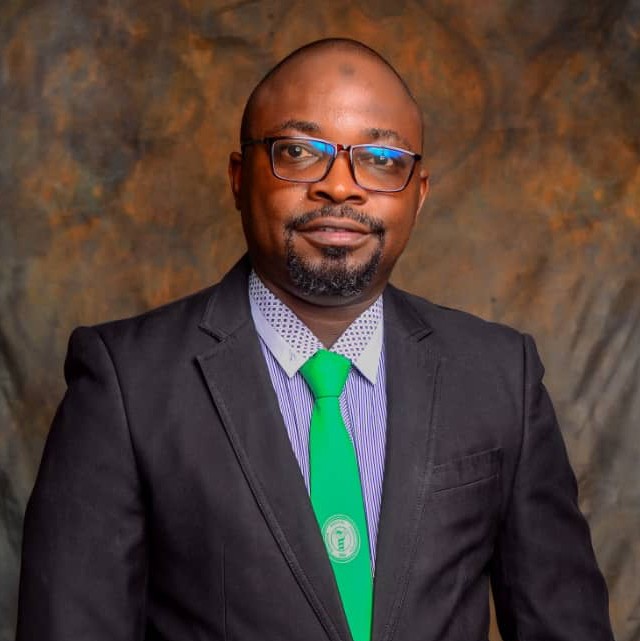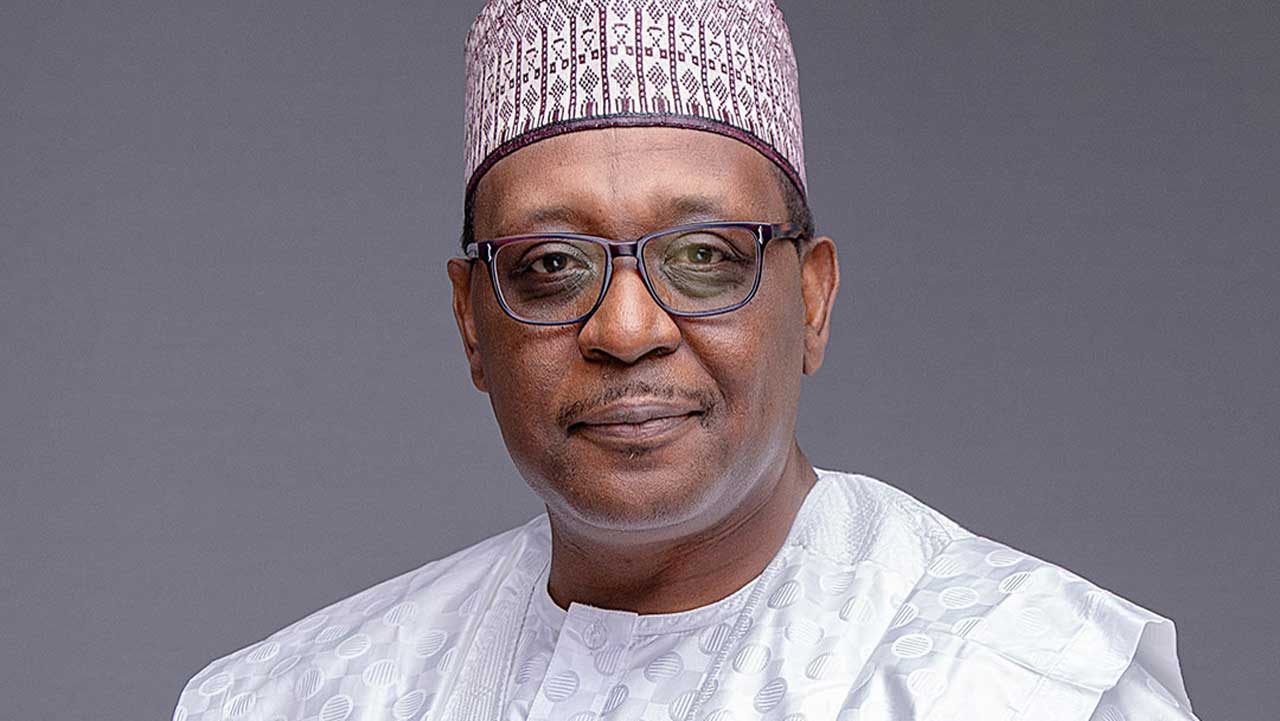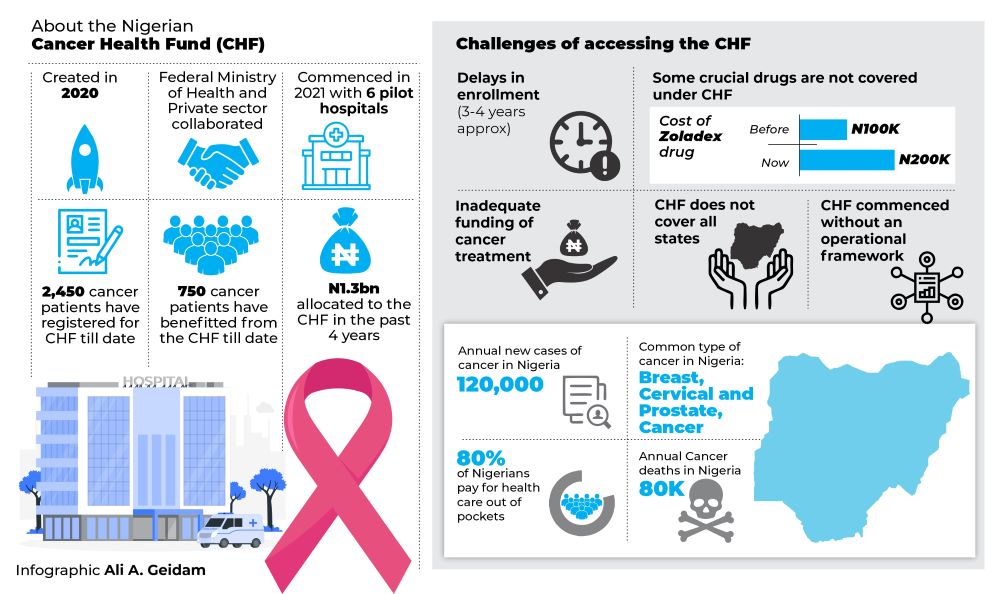The Cancer Health Fund (CHF) is an initiative of the Federal Government of Nigeria and some private sector partners aimed at supporting the treatment of indigent cancer patients. Four years after it was created, cancer patients and survivors lament that they have faced challenges with the implementation of the pilot phase of the initiative.
Monica Ihom (25) applied for the CHF in 2021 but didn’t receive any response till 2023. She was earlier diagnosed with breast cancer at the age of 20 in 2019.
During the time Monica applied till her CHF wallet was credited, she had to resort to soliciting for money from people to support her treatment. As at the time she was finally enrolled in 2023, she had already undergone surgery – chemotherapy (treatment that uses drugs to kill cancer cells) and radiotherapy (a cancer treatment that uses high doses of radiation to kill cancer cells and shrink tumours).
She said, “The illness was getting worse. So, I had to beg people to help me. If I keep on waiting for them, I will die. I was in school and also doing little business but had to drop out of school as a result of the illness. Now I don’t have money to support my treatment. My father is old and cannot fund my treatment, and my bothers don’t have anything too.
Cancer: FG partners pharmaceutical companies on high medicine costs
‘42,000 metric tonnes of maize A drop in river’, economist tackles FG
“I sell clothes for a living and my income cannot pay for a single cancer drug. I beg for support all the time, even my church members contributed money for me. It is only when I gather what people give me that I am able to buy drugs, and now no one is answering me again. So, I am fighting alone, and still begging for money to meet up with my treatment.”
Following her initial treatment, Monica was placed on three drugs: zoladex, herceptin and tamoxifen.


However, despite her enrollment in the CHF last year, Monica has only been able to access herceptin out of the N1 million approved for her by CHF. She has so far not been able to access zoladex through and still pays for tests from her pocket.
She said, “When we were filling the CHF form they told us zoladex was covered along with Herceptin, but whenever I go to the pharmacy in the National Hospital, Abuja, where I am receiving treatment, they either tell me zoladex is not covered or that it is not available and that I should buy from outside the hospital.”
She said the money in her in wallet is almost exhausted and she still needs to be taking more herceptin.
Even though she hopes to apply for more funds from CHF, Monica is apprehensive of not receiving a response on time.
While lamenting that she was in dire need of support to buy her zoladex drugs, she stressed that there was the need for CHF to respond to patients’ applications and requests on time so that that they could access treatment and not have their treatments disrupted.
She further said, “Please, they should help us to get zoladex through CHF because it is very expensive for now. Before it was N100,000, now it is over N200,000. The price is getting higher every day. I don’t have any money to buy it.
“My advice is that the CHF officials should be answering us in time. So we can use the the money to buy drugs and follow up early. Because if you don’t have money to follow up, the disease can take you away.”
She noted that some people applied for CHF but were not enrolled till they died. “There are many friends I met at the hospital, and I advised them to apply for CHF. They applied but they have not received any response till date. Some of them are dying one by one,” she said.
Monica is one of the thousands of cancer patients and survivors in the country who looked up to CHF with high hopes but three years since full implementation commenced have been on a long wait to access it or have assessed it but are experiencing challenges.
According to Globacan’s estimates, Nigeria records an estimated 102,000 new cancer cases annually. The World Health Organisation (WHO) says the commonest types of cancers in Nigeria are breast, cervical, prostate, non-Hodgkin lymphoma and liver. These cancer types and the other less common ones kill about 80,000 Nigerians every year.
CHF
Cancer treatment is very expensive and many patients in the country can either not afford the out-of-pocket cost for care or sustain it when they begin their treatment.
CHF was created by the Federal Ministry of Health in collaboration with a private sector-led coalition in 2020 to provide cancer treatment to underprivileged populations and to also strengthen the national cancer care ecosystem.
The Federal Ministry of Health said CHF commenced in 2021 with six pilot hospitals, one in each geo-political zone of the country: Ahmadu Bello University Teaching Hospital (ABUTH), National Hospital, Abuja (NHA), University of Benin Teaching Hospital (UBTH), Federal Teaching Hospital Gombe (FTH), University of Nigeria Teaching Hospital (UNTH) and University College Hospital (UCH).
The federal government, through the ministry, partnered with stakeholders such as the American Cancer Society, Roche, Pfizer, Mylan, Clinton Health Access Initiative, WWCV, Bicon and EMGE Resources Ltd for CHF.
Upon successful application, cancer patients access up to N2 million drugs, radiotherapy and chemotherapy.
According to the President of the Nigeria Cancer Society (NCS), Dr Adamu Alhassan Umar, CHF was initially called Catastrophic Cancer Fund (CCF), and that it “came about as a result of sustained efforts by players within the Nigerian cancer advocacy space with particular reference to the private sector because the concept began around 2017 during a business case development and presentation that was made at a cancer conference in Abuja.
“It was at that meeting that the idea was conceived to get a fund that is dedicated towards addressing cancers in those that cannot afford to pay for care. This is considering the fact that over 80 per cent of Nigerians pay for healthcare out of their pocket.”


The Director of Hospital Services in the Federal Ministry of Health, Dr Jimoh Olawale Salaudeen, said CHF was one of the best things to happen to the country, and that the fund was not in the hands of anyone but domiciled in the Central Bank of Nigeria (CBN).
He said following enrollment, the wallet created for each patient was credited with a minimum of N1 million which could be topped up when it was exhausted, noting that so far 2,450 cancer patients had registered for CHF and that 750 of them had been enrolled and were enjoying the fund.
He said the wide gap between those who registered and those enrolled is because some of them were discovered not to have cancer after tests.
He said a total of N1.3 billion has been allocated to the fund in the past four years.
He further said, “However, in the last meeting that we had with the National Assembly on CHF, they promised that another N1 billion would go for adult cancers, and that focus would also be given to children. They want to ensure that half a billion naira is put in the account for children in the 2024 budget.”
Experiences
Doris Sokpo (27) applied for CHF in June, 2022, and was enrolled in December of the same year. She said she used the N1 million she accessed from the fund for radiotherapy as she had already done chemotherapy before the money came in.
She said her major challenge with CHF was that she had not been able to access a crucial injection for her treatment through the fund.
She explained that, “Whenever I go to the pharmacy they will tell me CHF does not cover zoladex injection, and I am supposed to be taking it monthly. Currently, that injection is over N100,000. Infact the last time I asked it was N180,000.”
Doris said in October last year she got a message and calls from CHF officials that she should come and make use of the money in her wallet but she told them she really wished to use the money but was always told her medication was not covered under the CHF.
The CHF officials told her to go the pharmacy at the National Hospital, Abuja, where she is accessing treatment again, but nothing changed.
She said she has not taken the zoladex injection she was supposed to take for the month of January because she couldn’t afford to buy it herself.
She, therefore, said there was the need to make the CHF application process faster in order for it to benefit patients, noting that, “I know of a lot of people who applied years ago and they have not been able to access the fund till date. There are a lot of people out there who are really struggling and don’t have help from anywhere to be able to pay for medication for the illness. If the application process can be made better, it would help.”
Peace Samuel applied for CHF in 2020 and was enrolled soon thereafter. When she exhausted the first N1 million, she applied again and received another N1 million which she utilised for part of her treatment.
However, she said the challenge she faced was that she kept receiving debit alerts from her wallet which she didn’t utlise.
She said, “Sometimes I will be at home and be getting debit alerts from my wallet for what I didn’t use. At a time I didn’t even go to the hospital but was debited N400,000.”
She said met four people with the same complaint when she went to the hospital to complain about her experience, but noted that she believed the deducted monies were later refunded because (even though she didn’t get an alert for the refund) she was still able to access treatment worth the amount in her wallet.
She added that, “There is one support group I belong to. A lot of people are commenting on the group that they have applied over a year and have not been enrolled in the fund.”
She currently takes a particular injection every three weeks that costs over a million naira. “So if CHF is giving N1 million, it can only cover such patients for just one treatment. I think CHF managers should look at the kind of treatment patients are receiving to ascertain how much to give to each patient.”
Peace said what offered her a little succour was that she was on the National Health Insurance Authority (NHIA) which covered 50 per cent of her drugs.The drugs comprise herceptin and pajeta, and costs over N900,000.
She explained that, “As at December, I was paying N400,000, but last week I went to the hospital and was told the price had increased. I was asked to pay N704,000 for one injection.”
Another patient who simply wanted to be identified as Onome A (61) commended the implementation of CHF, saying it gave some cancer patients access to care that they wouldn’t have been able to access.
She said she applied for the fund in 2021 and was told to go to her location at the University of Benin Teaching Hospital (UBTH) to access care, adding that she was pleasantly surprised to be enrolled because she initially thought the fund was a scam.
She said, “When I got the first N1 million, I was so happy. The joy caused my pain to be lifted. Also, when I received the second one I was surprised that it could work like this in Nigeria. So, in my case, I can say that CHF tried.”
However, Onome said it is important for CHF to credit applications for funds immediately as delay could adversely affect cancer patients who do not have any other source of funding for their treatments.
She said there was need to expand the CHF to all tertiary institutions in the country.
While citing the case of her friends whom she sent the link to apply for the CHF, she added that they could not apply because they live and access care in health facilities in Lagos and Port-harcourt where the fund is not operationalised.
Another patient, who wished to be identified only by her first name, Maryam, said she travelled from Bauchi to the teaching hospital in Zaria to access care but was shocked when she was asked to pay for her tests and drugs.
Implementation of CHF
Experts say that CHF is a good initiative that can help ensure affordability of treatment for indigent cancer patients and the attainment of the Universal Health Coverage (CHF) if properly implemented.
Findings revealed that there was no operational framework for the implementation of the fund at its take off, and that the committee set up to oversee the fund virtually operated in a vacuum.
Investigations revealed that the challenges patients face range from delay in enrollment for CHF, lack of access to some drugs, inadequate funding, slow response to request for additional funding, few centres for accessing care to non-coverage of all cancers.
Meanwhile, some indigent cancer patients with other types of cancer lamented their non-inclusion in the fund.
They said there was an urgent need to address the challenges in order to fully benefit from the fund.
In 2021, the Senate Committee on Health expressed outrage over the non-utilisation of over N1.5 billion released to the ministry for the treatment of cancer patients through the fund.
The then senate committee’s chairman on health, Dr Ibrahim Oloriegbe, said N800 million representing 100 percent was fully released in 2020, and that N729 million representing 66 percent of the amount and of the total fund was released in 2021 but that no single patient was treated with the fund.
The Executive Director of Project PINK BLUE, a health and psychological trust centre, Runcie Chidebe, in 2022, also decried the poor implementation of the fund.
Speaking during a health financing policy dialogue, he said, “Since 2020 and 2021 the federal government has appropriated over N1billion for the treatment of indigent Nigerian cancer patients, and the Federal Ministry of Health was delaying disbursement. Sadly, when they were asked, their response was that they were waiting for President Muhammadu Buhari to launch the fund before it would be disbursed to indigent cancer patients.”

Dr Adamu of the Nigeria Cancer Society said the fund had issues such as patients having problems of transporting themselves to designated hospitals and paying for accommodation.
He added that the implementation of the CHF may not be as expected but that records show that some patients have benefited from it.
The President and founder of *Nest Of Hope Advocacy and Support Community, Engineer Dozie Akwarandu, said the implementation of CHF so far was abysmal, adding that, “Within this period of the fund’s conception the global theme has been to ‘close the care gap’, and one of the ways is to access affordable, quality treatments, yet cancer patients in Nigeria cannot access care.”
He further said, “Cancer patients are here and their burden is visible. Within the last four years of it’s take off we are still piloting. This shows that there’s no framework for its success.
“Presently, the truth is that the implementation failed. Patients who applied over two years ago are yet to get it, and the disease is not waiting. The supposed managers are aware of how invasive the disease is, especially when you start treatment and stop.
“Again, at some point almost every cancer patient/survivor becomes indigent, so I don’t know what measures determine indigency other than you can’t afford to pay.”
Akwarandu, who is a colorectal cancer survivor, said CHF should be made open for all cancer patients.
“The net should be spread to accommodate all cancers, all ages irrespective of where you are. Someone is dying of colorectal cancer and the fund wants to treat prostate. That’s not ideal.
“Let this fund cover treatments from surgery, radiotherapy, chemotherapy, biopsy and other procedures, which without, you can’t also diagnose or treat. We can bring insurance into this or apparently use the idea from HIV where a cancer patients or survivors can be getting their medication all the time.”
He further said there was the need to expand the CHF with at least a center in each state.
The Coordinator of Africa Health Budget Network (AHBN), Dr Aminu Magashi Garba, said that the issue of equity for cancer services when there were only six facilities in Nigeria providing support was grossly inadequate.
He said, “Cancer services should be such that any patient can walk in and access services irrespective of whether there is a wallet or account for that person or not. We need to devise a means of expanding the scope of those who are benefiting from the services.”
Ways to address challenges – Experts
Dr Adamu Alhassan said cancer advocates view CHF as a golden opportunity that would ensure universal health coverage and ensure access to cancer care.
He said, “And this is why we have sustained campaign of upscaling the number of cancers that are covered. In fact, we are advocating for coverage of all forms of cancers, and we are also calling for expansion of the hospitals that are running the CHF. It is our hope that all tertiary health institutions all over the country will be implementing this fund for the betterment of Nigeria.”
Dr Magashi on his part said there was the need for more funding in implementing CHF, adding that it should not only be funding from the federal government, but that the 36 states and the Federal Capital Territory (FCT) should also contribute.
He said, “We also need to support more coordination and strengthen the governance structure in managing the CHF. There is need to have a very strong team and dedicated secretarial support that can monitor and track the process.
He said the NHIA must be on the table as a critical stakeholder to provide insurance coverage for more cancer patients and survivors in collaboration with the CHF.
“We should aim at N5 billion to N10 billion for the CHF. So that every state in Nigeria can have something to start with while looking for more funding like resources from the Central Bank of Nigeria, and other innovative financing to ensure more cancer patients have access to services,” he said.
Relocation of CHF to NICRAT
Dr Magashi, who is one of the advocates that have been calling for the movement of CHF to the National Institute for Cancer Research and Treatment (NICRAT), said it would help “reduce bureaucracy. Also the ministry is a policy environment and is supposed to provide oversight function for the CHF, not to be implementing it.”
He said that having NICRAT managing CHF would allow better coordination and effective implementation.
He added that with the relocation, NICRAT could make a case to the National Assembly to get more allocations beyond the initial proposed N1 billion for the 2024 budget.
The Director General of NICRAT, Prof Usman Aliyu Malami, said the process of relocation of CHF to his agency was ongoing, but that the Coordinating Minister of Health, Prof Muhammad Ali Pate, had given approval for the relocation.
He said the relocation of CHF would simplify the process of disbursement of the fund to patients, ease access to funds and ensure quality treatment.
In addition, he said it would provide detailed monitoring, evaluation and surveillance of CHF because the institute dealt specifically with cancer activities.
Asked what the government was doing to address patients’ challenges with CHF, the Director of Hospital Services in the Federal Ministry of Health, Dr Salaudeen, said government would expand CHF as more funds came in.
On the unavailability of zoladex, he said the company that manufactures it had not joined the programme yet.
He explained that, “Once they join, patients will benefit from the drug.”
Dr Salaudeen, who is the chairman of the steering committee of CHF, further said the coming of pharmaceutical companies like Roche, Pfizer and Johnson & Johnson into the CHF had not only helped made drugs like herceptin and pajeta available for patients under CHF, but had also helped reduce the costs of the combination of one dose of each from N1.5 million to N600,000.
While saying the CHF was designed to have counterpart funding, he called on manufacturing companies to join the government in reducing the cost of care for cancer patients.
He said it was only patients that have applied for the fund in the last one month that have not been enrolled yet, adding that anyone who applied and was not enrolled over the years tried to cut corners or by-pass the requisite processes of enrolling for the CHF.
This material is produced under the Media-EIS Fellowship Program.

 Join Daily Trust WhatsApp Community For Quick Access To News and Happenings Around You.
Join Daily Trust WhatsApp Community For Quick Access To News and Happenings Around You.


